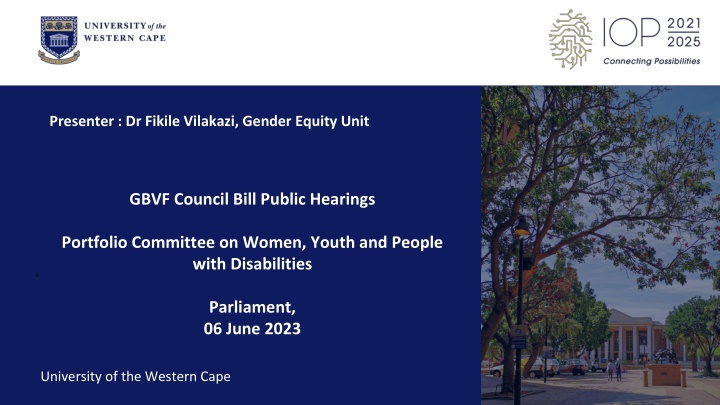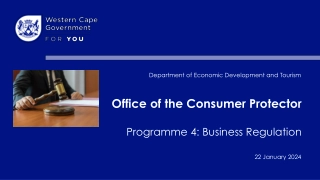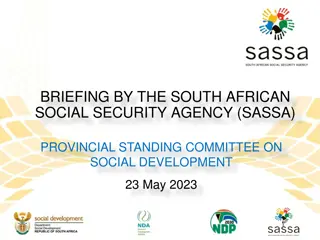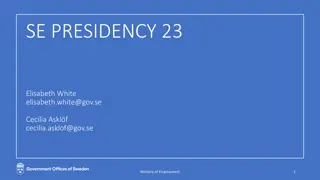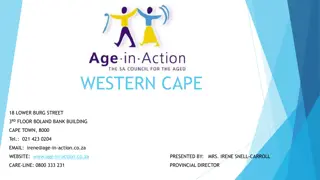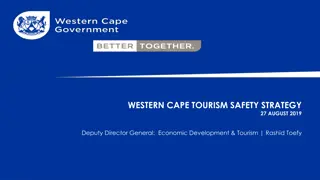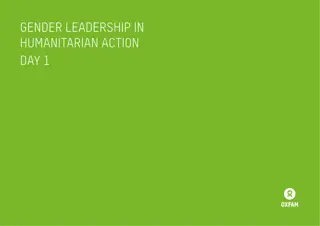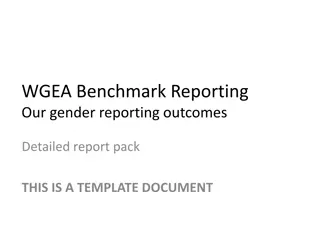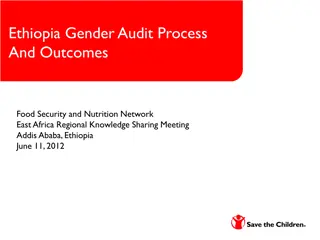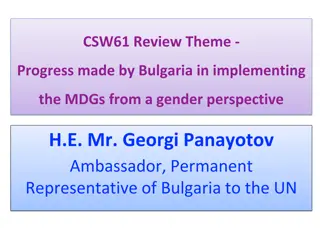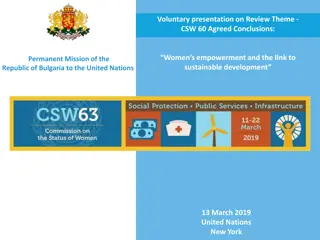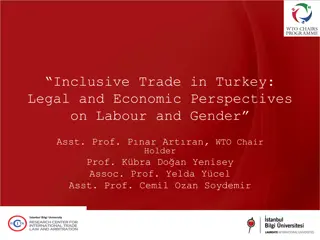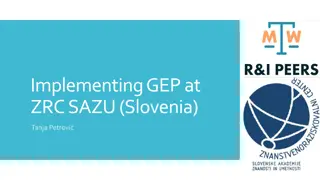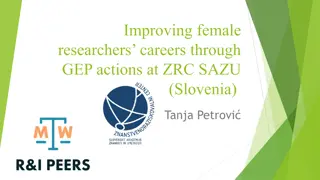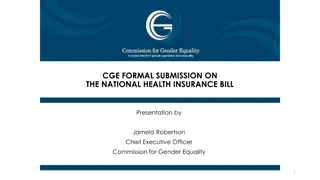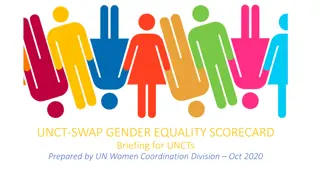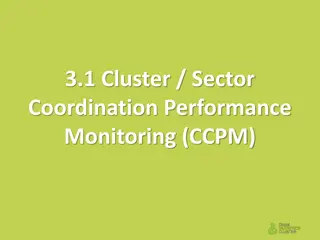Gender Equity Unit at University of the Western Cape: Promoting Equality and Social Justice
The Gender Equity Unit at the University of the Western Cape focuses on preventing discrimination, harassment, and harm based on gender, race, ethnicity, and sexual orientation. Their mission includes feminist research, education, and advocacy to empower marginalized groups. Through various activities and programs, they strive for equity in all spheres of life and promote social justice and human rights.
Download Presentation

Please find below an Image/Link to download the presentation.
The content on the website is provided AS IS for your information and personal use only. It may not be sold, licensed, or shared on other websites without obtaining consent from the author.If you encounter any issues during the download, it is possible that the publisher has removed the file from their server.
You are allowed to download the files provided on this website for personal or commercial use, subject to the condition that they are used lawfully. All files are the property of their respective owners.
The content on the website is provided AS IS for your information and personal use only. It may not be sold, licensed, or shared on other websites without obtaining consent from the author.
E N D
Presentation Transcript
Presenter : Dr Fikile Vilakazi, Gender Equity Unit GBVF Council Bill Public Hearings Portfolio Committee on Women, Youth and People with Disabilities s Parliament, 06 June 2023 University of the Western Cape
About UWC's Gender Equity Unit The Gender Equity Unit s activities and programmes are geared towards making sure that no one is discriminated against, harassed or hurt because of their gender, race, ethnicity and sexual orientation, and to facilitating the empowerment of particularly womxn and other marginalized groups, both on campus and within society at large.
Our Mission The Gender Equity Unit promotes Womxn and Gender equity and social justice through feminist research, education and advocacy in the University of the Western Cape and beyond.
Our Vision The leading Gender Equity Unit recognized for its feminist intellectual activism and capacitating societies towards ensuring equity in all spheres of life.
Our Aims 1) Ensure Women s and Gender equity in all spheres of life 2) Promote social justice and human rights 3) Enhance the students experience to facilitate successfully through raising awareness and education 4) Equipping the University of the Western Cape community and broader communities to become informed, conscious, and active citizens with regard to Women and Gender issues 5) Conduct relevant research to advance the thought leadership and influence
GENDER EQUITY UNIT STRATEGY Governance Provide accountability. Providing leadership for coordination of policy coherence and to ensure synergies Establish an institutional framework to address GBV : Policies, guidelines; Creation of system of accountability; Ensure observance of legislative and policy frameworks; M &E Framework leadership oversight and GEU ROLES Promote EQUITY INTERNAL Departments Faculties LEADERSHIP S T R A T E G I E S Share best practices and contribute to the body of knowledge on social inclusion, equity and transformation COORDINATION Fostering Social inclusion Research Strengthening Institutional response to equity, social inclusion and transformation through research initiatives Conducting ongoing evidence- based studies and producing scholarship on these topics Establishing and sustaining strong, strategic, and mutually beneficial research partnerships & SUPPORT EXTERNAL PARTNERS COP MONITORING AND EVALUATION Universities Non profit organisations Communities Programmes Facilitate Transformation Development and execution of programmatic interventions that are aimed to promote equity, social inclusion and transformation to enhance institutional culture Digitalisation activities of the programmes ENABLING ENVIRONMENT
The Gender Equity Unit welcomes the draft Bill to establish the National Council on Gender Based Violence and Femicide as a very good initiative that will assist the effective implementation of the National Strategic Plan on Gender Based Violence and Femicide, Vision 2030 which is geared towards the eradication of GBVF in society as adopted in 2019 by the President of the Republic of South Africa under the leadership of the interim steering committee on GBVF that was led by advocate Brenda Madumise. We also note that this Bill will have direct effect to the Department of Higher Education and Training [DHET] framework to end GBVF within institutions of higher learning in line with the objectives of the NSP-GBVF under the leadership of Minister Blade Nzimande.
We are aware that the University of the Western Cape has a mandate to feed into the Department of Higher Education and Training [DHET] Gender Based Violence and Femicide policy given our mandate as an institution of higher learning and teaching as aligned to that of DHET
In view of this, we also know that the Gender Equity Unit strategy has a responsibility to locate and assist the University of the Western Cape to fulfill this broader mandate to DHET by linking UWC s IOP 2021 - 2025 goals in response to the announcement made by the Minister of Higher Education, Science and Technology in April 2021 at the Higher Health Gender Based Violence and Femicide Dialogue.
The announcement by the Minister also made reference to the fact that DHET has developed a GBVF framework titled: Policy Framework to address gender-based violence in the Post School Education and Training [PSET] system which was adopted in July 2020.
The Policy Framework intends to assist Post School Education and Training [PSET] institutions address the occurrence of GBV and to provide a monitoring instrument to the Department to assess the implementation of the Policy Framework.
The Policy Framework aims to: 1. Conceptualize GBV and define its manifestation in terms of existing laws and policies; 2. Detail the international and national regulatory framework compelling institutional and departmental responses to GBV (F); 3. Provide guidance around the structures, mechanisms and processes that PSET institutions must put in place to address GBV (F); 4. Compel PSET institutions to both create awareness of GBV, related policies and prevent incidents of GBV (F); and Set out a framework for oversight of the Department and PSET institutions development and implementation of GBV (F) policy.
The DHET GBV (F) policy framework is a direct response to the implementation of the National Strategic Plan on Gender Based Violence and Femicide [NSP-GBVF] that was adopted by President Cyril Ramaphosa in 2020 to end the scourge of gender based violence in South Africa. The Gender Equity Unit participates directly in the work of the NSP-GBVF through its pillars in order to fulfill UWC s GBVF mandate of ensuring gender equity by creating gender-based violence free zones at the University and all its structures.
The University community is also encouraged to actively participate in these pillars and the broader work of NSP GBVF, this is an open platform to all who have an interest to end gender-based violence and femicide in our lifetime. You can contact the End GBVF Collective in order to get involved in the pillars.
THE CONTEXT OF GENDER EQUITY WITHIN THE POST SCHOOL EDUCATION AND TRAINING SECTOR Mdleleni et.al (2021) explain that, data from the Council for Higher Education in 2017 shows that of the 3,040 senior managers in higher education, only 44.76 per cent are females. Female academics formed 29 per cent of professors, 41 per cent of associate professors and 46 per cent of senior lecturers. However, at the level of lecturer and junior lecturer, the majority were women. Subsequently, this data highlights two fundamental issues. Firstly, it shows that although women make up the mainstream of the staff, their representation at executive levels is relatively truncated.
THE CONTEXT OF GENDER EQUITY WITHIN THE POST SCHOOL EDUCATION AND TRAINING SECTOR Recently the Mail & Guardian published almost similar results which show disparities between people of varied genders within Universities when it comes to holding positions of influence, where we see that out of 26 Universities in South Africa, less than 5 women occupy positions of being Vice Chancellors.
In addition to this, we have seen recently heightened gender-based violence and femicide within Universities where students are subjected to extreme situations of sexual harassment, sexual assault, rape, hate crimes even murder..
Staff within universities are not immune to these circumstances either where academics being victimized and violated by students and by other staff members on the grounds of gender and sexuality. we have seen
This conservatism on the grounds of culture, tradition, religion and socialization continue to act as barriers to freedom and autonomy even amongst progressive voices and spaces within Universities and on the public domain. remains a huge problem. Heightened amongst others
In 2022, an engineering student was allegedly murdered by a male student at the Mangosuthu University of Technology (Timeslive, 2022), whilst a similar incident happened in 2021 where a boyfriend confessed to killing her 23-year girlfriend at Forthare University (News24, 2021).
There are many other incidences of student rape and murder including Uyinene Mretywana of UCT in 2019 and recently at UWC the killing of an accounting student Kamva Dasi in Belhar during an armed robbery (IOL, 2023). Similar incidences were reported by students a in 2022, so this is a recurring challenge for UWC
Other cases that remain a challenge are those related to sexual harassment and sexual assault which continue to be a problem within UWC spaces particularly for and amongst students. Lastly, issues of employment equity remain a challenge where UWC statistics in terms of equity still reflect the gender binary of male/female, woman/man where data on experiences of non-binary, transgender and gender non-conforming staff and students remains invisible.
UWC is currently working on a Gender Equity Policy that intends to create gender balances in this regard to assist the University community to implement an inclusive and diverse gender praxis. This is experienced is similar in most Universities of South Africa (CoP, 2023).
We therefore wish to convey to the committee that the post school education institutions have not adequately engaged with the Bill and will require enough time to do so and therefore suggest that the Bill be revised to enable this process of consultation to take place within and amongst the 26 Universities of South Africa in varied provinces and amongst other stakeholders within society who may express a similar need.
We are therefore troubled by the fact that this Bill has not been placed under section 76 of the Constitution which enables the National Council of Provinces to ensure adequate participation at provincial level by varied stakeholders and thereby limits effective engagement and public participation on this very important Bill.
Honorable leadership, our view is that the draft Bill as it stands be revised and placed under section 76 to enable adequate engagement at provincial level as a way to broaden public engagement and participation. We also support a report that was developed by the Commission for Gender Equality during its stakeholder consultation that was held on the 15thof May 2023, which we were a part of.
We concur with sentiments that were raised by ourselves and varied stakeholders at that consultation meeting in relation to this Bill. Kindly see report of the CGE attached to this submission. Lastly, we recommend the inclusion of Department of Higher Education and Training [DHET] and the Department of Basic Education as a stakeholder in this Bill under section 6
Thank You Director, Dr Fikile Vilakazi Email: fvilakazi@uwc.ac.za and gender@uwc.ac.za Tel: +27 21 959 2813/2 Mobile/Whatsapp: +2783 581 6161
